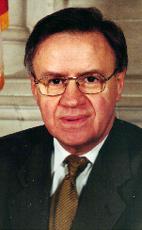Mr. Speaker, we are all aware that Bill C-24 will bring significant changes in the way political activities are financed and the way all participants in the political process report on their financial operations.
I would like to point out to the House that five or six years ago, I introduced a private members' bill in the House, a bill which unfortunately was not voted upon. I based my argument on a thesis by a doctoral student at the University of New Brunswick, a Mr. Stewart. He proposed a revolutionary change that was really quite simple. He felt that it was time for the state—the government, the people—to finance the political parties.
Why? Because the democratic process is such that political parties are the most fundamental part of our democracy. If the method we use to elect our representatives is not transparent and clear, democracy will suffer.
In any case, the private members' bill that I introduced in the House was inspired, as I said, by his thesis that the state should foot the entire bill for an election. It may seem like a large amount, but I did some research before introducing that bill. I gathered information from Revenue Canada, Elections Canada, and even the Department of Finance, in order to find out how much the current system was costing us with tax credits, corporate tax deductions, and so on. To my great surprise, the total was over $25 million per year.
Thus, we will have gone through all that paperwork and all those procedures, when it would have been simpler for the government to take responsibility, saying that if it already costs over $25 million, it would be much easier to have an equitable system, as Bill C-24 recommends.
Obviously, this is a step in the right direction. I was well aware that the state was not going to provide funding overnight. I reasoned that if ten people were stopped in the street and asked, “Do you believe that the political party financing system is fair, just and transparent and that the wealthy have no undue influence?”, obviously, nine out of ten people would say, “Hey, do I look stupid?” Everyone knows that there are minor problems and that there is a lack of transparency.
So, my argument was as follows. If the electorate is not convinced that the political party financing system is open and transparent, we have the obligation to change it. If we believe that it is just, then we must defend it and prove to our fellow citizens that it is fair and transparent. But this is not the case. So, we have bills such as this one. The argument is quite simple. We represent the people, but if they have a very poor perception of something, it must be changed.
But, it must be said that Quebec was the first province to have taken the initiative to introduce such changes. I remember, in 1964, the Lesage government took the first steps. It limited nomination expenses per riding. Previously, there were slush funds. People know a little bit about our provincial history in this regard.
In any case, this turned out to be the first step in limiting riding expenses.
Later, in 1977, the year René Lévesque came to power, the government set limits on the donations individuals could make to political parties. These were all steps forward.
Of course, when I proposed my private member's bill at the time, I thought there was eventually going to be a much more open and transparent system. If we believe profoundly in our democratic system—I do and I am convinced that we do have a democracy—we must ensure that the party financing process, which is the very basis of democracy, is fair, equitable and above all, transparent. The whole idea of the wealthy or large corporations unduly influencing the government is no longer valid. I am convinced that this will be a great step forward.
As I indicated, in preparing my bill I consulted many people and organizations not only in my region but also across Canada. I spoke to a number of people and everyone said the same thing, “It goes without saying that, in our system, people have a perception that must be changed”.
Bill C-24 marks a step forward. There is no doubt the day will come—I hope I will live long enough to see this—when the state will take over party financing and fund-raising campaigns will no longer be necessary. I know that for many of my hon. colleagues, this is a big burden. We spend a great deal of time raising funds for election campaigns. All this could end.
I will conclude by saying that it is not complicated at all. In fact, it is very simple. We must correct the misconception our fellow citizens have. This is a step forward. I hope that in coming years, in spite of the great many problems experienced in the past, we will be able to show that our system works. It is a start. Let us hope that this is the beginning of a future party financing system that will be the most equitable and democratic in all democratic countries.

